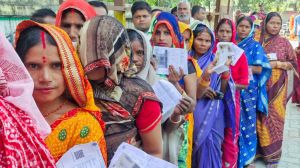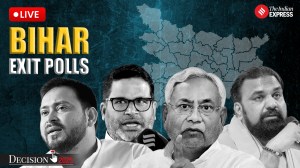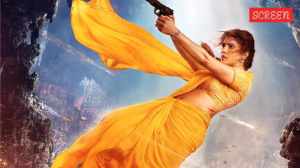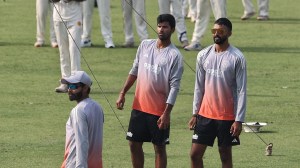I realise the pluses and minuses (of contesting),but I am not a sacrificial animal
NDAs Vice-Presidential nominee Jaswant Singh says the constitutional offices of President and Vice-President have become victims of the political system.
In this Idea Exchange,NDAs Vice-Presidential nominee Jaswant Singh says the constitutional offices of President and Vice-President have become victims of the political system. This session was moderated by Contributing Editor Coomi Kapoor
Coomi Kapoor: Do you think you are in a race where you have very little chance of winning,where the numbers are stacked against you?
Jaswant Singh: Someone had earlier asked me the same question. I had said that in vernacular,I would be termed an umeedwaar. And I have been termed an umeedwaar because I have umeed,otherwise not.
Maneesh Chhibber: Some would also say that since nobody else wanted to contest,you might be,in the vernacular,the bali ka bakra. How much of a chance do you give yourself?
Jaswant Singh: It is the beginning of the campaign. Of course,I realise what the pluses and minuses are,but I am not a sacrificial animal. It is necessary that some new and important questions relating to the election to these two high officesof the President and the Vice-Presidentof the republic be raised and at least attempted to be answered.
Coomi Kapoor: How did Hamid Ansari conduct himself as Vice-President?
Jaswant Singh: Mr Ansari and I worked together in the Ministry of External Affairs in different capacities. Mr Ansari was the ambassador in Saudi Arabia. So I have known him. But as for the discharge of his responsibilities as the chairman of the Rajya Sabha or the Vice-President,Im sorry,I would desist from commenting.
Maneesh Chhibber: How did your name come to be finalised for this post? The party was dithering till the very end.
Jaswant Singh: No,I dont think there was any dithering in the party. It was Shri L K Advani who raised this topic with me,quite a few months ago,and asked if I would consider contesting for either of these two positions. I didnt take it seriously then. He repeated this two-three times. One day,I sat with him and discussed it. It was only after due deliberations with him that he advised I consider it seriously. I reflected on it. But by then,Mr Sangma had thrown his hat into the ring. And then it was fairly known that I would be required to contest the vice-presidential elections.
Appu Esthose Suresh: When you met Mulayam Singh Yadav,did you discuss your candidature for President or Vice-President?
Jaswant Singh: This is one of the by-products of the imaginative thinking processes of the media. I had gone to meet Mulayam Singhji because I was asked by the party to go and ascertain if we could expect support from him for Mr Kalam. Mulayam Singh said its a good name. Thats all that happened. But its purely by chance that to my great misfortune,when I went there to see him,there was a posse of television cameras,not to see me but because Ramdev had also gone there to see Mulayam Singhji.
Ajmer Singh: After the presidential results were announced,P A Sangma alleged that UPA manipulated the election. Your comments.
Jaswant Singh: I am not really familiar with Purno Sangmas comments. But why do you need my comments on the observation that the ruling establishment manipulated the dispensation of government goodies so that the whole process could be influenced? Why dont you just see the development of events from the time of the announcement of Mr Sangmas contest and the shifting of positions by various political parties? You have written about it.
N P Singh: Is your nomination for the post of Vice-President part of a larger scheme of things? Is it an attempt by the BJP to sideline you before 2014?
Jaswant Singh: Sideline? How do you sideline ideas? You can move or push personalities but what about ideas? You talk of 2014. It is about a year-and-a-half away. Why dont we wait and watch how the situation develops?
D K Singh: In hindsight,do you think your party should have placed their bets on a party candidate rather than banking on a borrowed candidate,Sangma,for the presidential election?
Jaswant Singh: Of course,hindsight has always got a 20/20 vision. But in this particular case,its not hindsight. It is the evident reality of what we were faced by. A situation arose in which two political partiestwo chief-ministers of the countrygot together and announced the candidature of a certain personality who has been the Speaker of the Lok Sabha. Now that having been done,it would have been imprudent on part of the NDA to not have taken that seriously.
DK Singh: Would it be fair to say that for the opposition,the presidential and vice-presidential election this time is more about positioning for future alignments?
Jaswant Singh: I touched upon the very high politicisation of these two offices. I dont say that these offices can be free of politicisation because they are the products of the political system. But I dont know if the original intent was to convert a product of the political system into a victim of the political system. What we are going through is that these two high constitutional offices have been victimised in the process.
Coomi Kapoor: Some of your allies didnt support you in the presidential election. And in Karnataka,some of your own MLAs didnt support you. Isnt the BJP a bit of a loser in this presidential election?
Jaswant Singh: I wouldnt want to jump readily to conclusions on whether the BJP is a loser or a learner. All political parties must learn from the processes they undertake. And in this case,in Karnataka,we witnessed a slide in the arithmetic support pattern. I think the party leadership is examining the who,what,why of this slide. As far as MPs are concerned,there has been no loss in that category.
Coomi Kapoor: But two of your major allies didnt support you.
Jaswant Singh: That was on account of several other reasons. That was in the initial stages of the campaign. And perhaps,there should have been greater consultation prior to our taking a stance. But now,the NDA is united solidly for the vice-presidential election.
Pranab Dhal Samanta: Both Pranab Mukherjee and you are politicians who have been in public life for long. Dont you think that the BJP and Congress should have had a conversation right at the start?
Jaswant Singh: This is my ninth term in Parliament. So thats quite a long time. Yes,there should have been consultations. Who should initiate these consultations? This is a debatable question. Either the ruling party or the majority party should say,Look,this is a constitutional office. Why dont we sit together and find a solution to both these offices? There are a number of other constitutional positions for which the government and the opposition should sit together and try and arrive at a unified choice. If not the government,should the opposition reach out? The counter-argument to that is that in todays political environment,that would be treated as a sign of weakness.
Swaraj Thapa: P A Sangma went to the extent of saying that some of the parties that supported the UPAs presidential candidate were given packages by the Congress. Do you support that view? Second,Sangma also said that there should be a code of conduct for the vice-presidential election. What is your view on that?
Jaswant Singh: Its not a code of conduct for these high constitutional offices. Lets not seek the LCM (Lowest Common Multiple) of the situation. Lets try and attain the Highest Common Factor of these situations.
DK Singh: Are we correct in saying that this election is not the last milestone in your long political journey?
Jaswant Singh: No,I think I have got some more to give to the country.
Ravish Tiwari: As a BJP leader,how do you see the party progressing towards 2014?
Jaswant Singh: One of the issues that troubles all observers today is the state of the inner health of both the Congress-led UPA and the BJP-led NDA. Why is there a degree of scepticism about both these alliances in the country? What is it that has gone wrong? What is it that needs to be done or can be done? If you examine the situation today,the sinews of the extreme centralisation of post-1947 have loosened to the extent that the country is truly federal. But economic management is still highly centralised. And this results in a great disjuncture. Its one of the problems that we face. The reverse is the situation in China. In 1949,they also started on the journey of nation-building. Now,in China,economically,they are highly decentralised and politically,they remain centralised,which is the reverse of India. They are also suffering. There are questions that these two situations raise. There are many aspects of what we face today.
Ajmer Singh: Narendra Modi is being projected as the next PM-candidate. What is your view on that?
Jaswant Singh: Why do you wish me to comment on a prospect that is still a year-and-three-quarters away? An appropriate decision will be taken by the leaders of the party at the appropriate time. Were the allies to ask me this question,I would say the same thing.
Maneesh Chhibber: Do you have faith in the current leadership of India?
Jaswant Singh: I dont have faith in the current leadership of India. I personally think its now established that the system of diarchy cannot work in a democracy. You cannot have authority with no responsibility and no capability. And then you have some capability with no authority or power.
Appu Esthose Suresh: Do you agree with the view that Pranab Mukherjee is going to be one of the most powerful presidents that India has seen at a time when there are predictions of a fragmented Parliament?
Jaswant Singh: It is not the person who is powerful. It is the office of the President that is constitutionally and inherently endowed with responsibility. We are a republic. Let us not start assuming dictatorial authority or granting dictatorial authority to any office of the republic.
Swaraj Thapa: But thats a debate that the BJP has always brought up,particularly L K Advani,when he says there should be a powerful Prime Minister.
Jaswant Singh: I understand. I think the use of the word powerful lends itself to a variety of interpretations in a democracy. When the democratic functioning becomes enfeebled and governance ceases to be effective,then we have demands like this. I would much rather say we need capable and effective governance. Why do we hanker or yearn for what you call powerful?
Malvika Verma (student,Springdales,Dhaula Kuan): Dont you think ego tussles and rivalry within your party are hurting its prospects?
Jaswant Singh: I was 28 when I resigned my commission and jumped into the fourth general election. I had no idea about politics and electioneering. I had a lot of chips on my shoulders because it was post-1962 war with China,post-1965 war with Pakistan. The year was 1966. I had no pension,no gratuity and no knowledge of how politics functions but I jumped into it. I thought I had the answers to questions. Now,11 general elections later,I no longer have these chips on my shoulders. I have held several responsibilities in government. And it is an honour to approach this great responsibility with a greater degree of humility. Politicians do not have the answers. Answers will evolve through searching and honesty.
Divya Sahni (student,Springdales,Dhaula Kuan): What would your goals be if you are elected the Vice-President?
Jaswant Singh: I would pray and hope that I am able to discharge my responsibilities in accordance with that high office.
Dilip Bobb: Do you subscribe to the view that the vice-president should not have a second term?
Jaswant Singh: I will separate myself from personalising this. But I think we do need to reflect on this very seriously as to why no Vice-President was conferred this distinction. Also,our first President Rajendra babus second term was an issue of contention between him and Pandit Jawaharlal Nehru. A situation arose wherein Rajendra babu asked very pointedly if the Prime Minister could be elected twice,then why not the President? We need to evolve a convention in this regard because allowing for a second term or not allowing it becomes a kind of political patronage. And less the political patronage in these two positions,certainly the better for our country.
Coomi Kapoor: As a former army man,what do you think about the increasing corruption in the Armed Forces?
Jaswant Singh: I am horrified and greatly distressed by it. When I read of these malfeasance,I despair as to where we have brought our armed forces. I was commissioned in 1957 when I was barely 19,when the Republic was only 10 years old and the stamp of the ideals of Independence was still very much evident. What has happened is that those ideals have evaporated and diluted as to be barely visible. Whos responsible? The army ought to look at itself before it asks anybody else to answer the questions.
Pranab Dhal Samanta: Do you then think we are facing the consequences of the decisions you took on the Kandahar issue?
Jaswant Singh: Kandahar wasnt my decision,it was a Cabinet decision. Before that meeting,Prime Minister Vajpayee had called a meeting of all the political parties. In this case,to release three imprisoned terrorists is,in principle,bad. To know that your action-inaction will result in the deaths of 166 innocents is very bad. No government can possibly let 166 people die. We had intelligence that this would happen. When I landed in Kandahar,I instantly recognised the presence of ISI.
Are we suffering the consequences of that? No. I remind you of a wonderful dargah in the Valley (Chrar-e-Sharief) that was burnt. Mr Narsimha Rao was the Prime Minister. I know for a fact that Mast Gul vacated the dargah and he was escorted to the LoC and permitted to go. If I was asked to make a choice,I would unhestitatingly make a choice for the life of human beings. My going there was because it was necessary for somebody to go as the officials had said,What if there is a last minute hiccup? And there was a hiccup. I have described it in my book. Will I work for saving lives? Always.
Transcribed by Sumegha Gulati



- 01
- 02
- 03
- 04
- 05




























